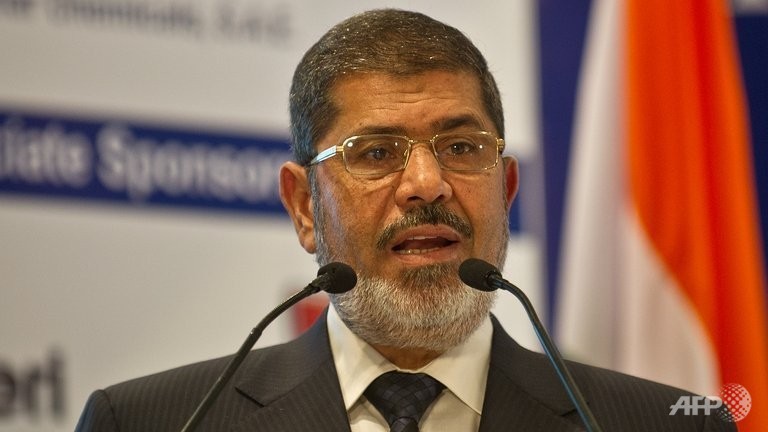Egypt's Morsi rules out talks as hostage video appears

Egypt's President Mohamed Morsi (AFP/Manan Vatsyayana)
CAIRO: Egypt's President Mohamed Morsi on Sunday ruled out negotiating with the kidnappers of three policemen and four soldiers who appeared to plead for their release in an online video.
The abductions on Thursday in the Sinai Peninsula prompted angry police to shut down border crossings with Gaza and Israel, piling the pressure on Morsi to secure the hostages' release.
"There are no negotiations with criminals and the awe of the state will be preserved," Morsi was cited as saying by the official MENA news agency.
A video posted on YouTube on Sunday appeared to show the seven hostages, blindfolded and with their hands on their heads, identifying themselves.
One of them is prodded by what appears to be a rifle held by an abductor off screen before another hostage says the kidnappers want the release of detained Bedouin "political activists".
He mentioned by name a Bedouin militant sentenced to death after a 2011 attack on a police station in the north Sinai town of El-Arish.
"We hope that you, president, quickly release the political activists from Sinai as soon as possible because we can no longer stand the torture," said one hostage.
The video, posted online by an anonymous account, was later removed from YouTube, which posted a message saying it violated its "policy on violence".
Neither the presidency nor the military responded to requests for comment.
One of the hostages in the footage bears a strong resemblance to a hostage in a picture held by relatives who joined the police protest at the Rafah border crossing.
The policemen, who worked at border crossings, and soldiers were kidnapped at gunpoint while travelling to their homes on leave.
Attacks on police and soldiers in the sparsely populated peninsula have surged since an uprising that overthrow president Hosni Mubarak in 2011, as have cross-border attacks on Israel.
The north of the peninsula is underdeveloped and has become a haven for Islamist militants, unlike the south which is dotted with beach resorts.
In August 2012, suspected Islamist gunmen killed 16 Egyptian soldiers near Israel's border and commandeered an armoured vehicle into Israel, where they were stopped by a helicopter strike.
The Mujahedeen Consultative Council, an Al-Qaeda-inspired militant group that appears to be led by Bedouin and Palestinians from neighbouring Gaza, has claimed responsibility for the attacks on Israel.
What the stars mean:
★ Poor ★ ★ Promising ★★★ Good ★★★★ Very good ★★★★★ Exceptional
Latest News
More News
- Russian President congratulates Vietnamese Party leader during phone talks (January 25, 2026 | 09:58)
- Worldwide congratulations underscore confidence in Vietnam’s 14th Party Congress (January 23, 2026 | 09:02)
- Political parties, organisations, int’l friends send congratulations to 14th National Party Congress (January 22, 2026 | 09:33)
- 14th National Party Congress: Japanese media highlight Vietnam’s growth targets (January 21, 2026 | 09:46)
- 14th National Party Congress: Driving force for Vietnam to continue renewal, innovation, breakthroughs (January 21, 2026 | 09:42)
- Vietnam remains spiritual support for progressive forces: Colombian party leader (January 21, 2026 | 08:00)
- Int'l media provides large coverage of 14th National Party Congress's first working day (January 20, 2026 | 09:09)
- Vietnamese firms win top honours at ASEAN Digital Awards (January 16, 2026 | 16:45)
- ASEAN Digital Ministers' Meeting opens in Hanoi (January 15, 2026 | 15:33)
- ASEAN economies move up the global chip value chain (December 09, 2025 | 13:32)
















 Mobile Version
Mobile Version